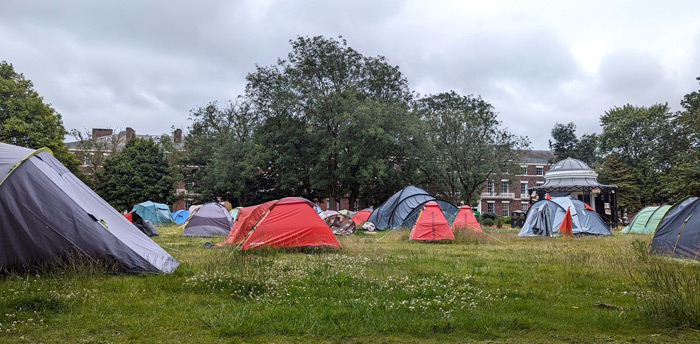On 6th June, students from Liverpool University set up a student encampment in Abercromby square, now renamed Alareer Square, in solidarity with the people of Palestine and in protest against the atrocities being committed against them and the West’s complicity. An unexpected consequence of this has been positive changes to the local ecology of the land around the students’ swarm of tents, as Fin MacLeod explains.
‘Since the first tent was pitched at the Alareer Square student encampment, we’ve witnessed something incredible happen to the natural environment around us.
Our occupation of the land, formerly known as Abercromby Square, has prevented groundskeepers from regularly trimming the grass around our tents. Initially stubborn, they tried to continue their work through the first two weeks. However, once we expanded onto the second and third fields, they couldn’t navigate their tools around the park, so they gave up.
The first change we noticed were the flowers. All around the square, and especially around our tents, daisies, dandelions, and other wildflowers have sprouted from the earth. This regrowth has also brought more bees, birds, and insects to the land. Wildlife now roams the park in numbers I’ve never seen before in my time as a student.
“In the background of our larger acts of protest, like picket lines and leaflet drops, we are waging an ecological battle for the restoration of natural ecosystems – one where wildlife can thrive around our city.”
Before we pitched up, the university mowed the grass fortnightly, sometimes even weekly. Its length was harshly kempt – a physical metaphor for the trimming back of diversity and beauty in pursuit of uniformity and rigidness. Some patches are now knee length, a small yet symbolic image of our growth as an encampment and as a movement.
In the background of our larger acts of protest, like picket lines and leaflet drops, we are waging an ecological battle for the restoration of natural ecosystems – one where wildlife can thrive around our city. Liverpool University is apparently committed to ‘sustainable futures’, pledging to be ‘net zero by 2035’, yet simultaneously bulldozes what little green space is left for roads, offices, and other expensive and unwanted infrastructure projects.
The primary focus of our encampment is, obviously, for Palestine. But the ideas permeating this space reach much further: anti-imperialism, decolonialism, socialism, feminism, and ecology – not corporate ‘climate plans’ which many institutions, including our own, tend to shove in our faces.
Alareer Square is so important not just for Palestine, but also for the climate movement (both intersecting struggles, I should add). At the same time as this encampment, temperatures in Athens reached highs of 44⁰C, meanwhile 1,300 people on the Hajj pilgrimage to Mecca died due to extreme heat in what is now known as the ‘2024 Hajj disaster’.
In order to rescue our planet from impending climate catastrophe, imperialist wars and resource extraction must be ended. Simultaneously, environmental regeneration must take place. Even small acts of ecological resistance, like our own, are part of a much greater movement.
We’ve planted wildflower seeds all around the park, and have plans to raise an olive tree before we leave. However this camp ends, either in victory or eviction, the seeds we have planted, both physically and metaphorically, will remain on the square for years to come.’



Permalink
Quick correction: they actually started the camp in early May …what a commitment and sacrifice!
As for the piece, what a lovely and critical reflection. Political ecology meets international solidarity. Love it. Liverpool is blessed to have students like this. That university management sanctioned police repression against them for an incident related to chalk was horrifying.